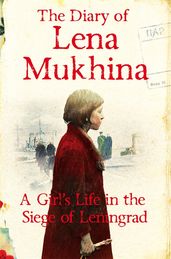The Diary of Lena Mukhina
Lena Mukhina
Translated by Amanda Darragh Love
Synopsis
In May 1941 Lena Mukhina was an ordinary teenage girl, living in Leningrad, worrying about her homework and whether Vova - the boy she liked - liked her. Like a good Soviet schoolgirl, she was also diligently learning German, the language of Russia's Nazi ally. And she was keeping a diary, in which she recorded her hopes and dreams. Then, on 22 June 1941, Hitler broke his pact with Stalin and declared war on the Soviet Union.
All too soon, Leningrad was besieged and life became a living hell. Lena and her family fought to stay alive; their city was starving and its citizens were dying in their hundreds of thousands. From day to dreadful day, Lena records her experiences: the desperate hunt for food, the bitter cold of the Russian winter and the cruel deaths of those she loved.
A truly remarkable account of this most terrible era in modern history, The Diary of Lena Mukhina is the vivid first-hand testimony of a courageous young woman struggling simply to survive.
Details
Reviews
Sixteen-year-old Lena Mukhina's diary is to the Siege of Leningrad what Anne Frank's was to Nazi-occupied Amsterdam ... A must read for young adults and their parents everywhere.
Even at the height of the Leningrad Siege, starving and surrounded by death and destruction, Lena Mukhina somehow continued to keep a diary. Her story, though searing, is an inspiration.
The Anne Frank of Leningrad ... Almost unbearably moving ... Her suffering is real and terrible. As we read on, we can feel something important sapping out of her. Call it spirit, if you like, or the optimism of youth. But adversity does not strengthen her; it corrodes her. She gets away, but the best of her, we suspect, she has left behind.
Lena's diary, sustained by emotional stamina and driven by daily drama, describes one of the worst civilian horrors of modern wartime.
